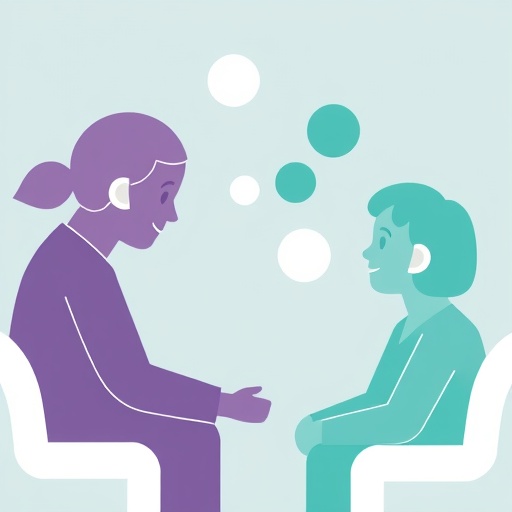In the realm of healthcare research, a critical area often overlooked is the role of family caregivers, particularly those caring for individuals with chronic illnesses. A recent qualitative study conducted in Iran highlights the pressing needs of family caregivers of patients suffering from end-stage chronic obstructive pulmonary disease (COPD). This research, led by Sami, R. and colleagues, delves deeply into the emotional and physical burdens faced by these caregivers, illuminating an aspect of healthcare that warrants greater attention and support.
Chronic obstructive pulmonary disease is an advanced and debilitating condition that severely impacts the quality of life of patients, often culminating in the need for intensive long-term care. The disease’s progression not only affects the patient but invariably places substantial stress and demands on family caregivers who become the primary support system. This study sheds light on these caregivers’ experiences, desires, and challenges, offering valuable insights into their needs.
Family caregivers frequently navigate an emotional landscape fraught with uncertainty, stress, and exhaustion. Caregivers often report feelings of isolation, as their responsibilities can prevent them from engaging in social interactions and seeking support from others. The study highlights these emotional challenges, emphasizing the need for mental health resources tailored to caregivers who are often overwhelmed by the demands of caregiving while managing their own lives.
Physical health is another crucial aspect that the study addresses. Many family caregivers report neglecting their own health as they prioritize the needs of their loved ones. The exhausting nature of caregiving can lead to physical ailments such as fatigue, musculoskeletal pain, and even chronic conditions due to stress. This alarming trend signifies that while caregivers are essential for the well-being of their loved ones, their own health often suffers in silence.
In addition to these emotional and physical strains, the study reveals that caregivers often lack adequate training and resources to manage the complex needs of patients with end-stage COPD. Many caregivers feel ill-equipped to handle medical tasks such as medication management, mobility support, and emergency responses. This gap in knowledge can exacerbate stress, leading to feelings of inadequacy and anxiety. As such, it becomes clear that addressing the educational needs of caregivers is vital in ensuring both caregiver and patient well-being.
The qualitative nature of this research offers in-depth perspectives, drawing upon the real-life experiences of caregivers. Each individual’s story is a powerful testament to the struggles faced within the confines of the home, where the caregiver navigates a world governed by the patient’s deteriorating condition. Sharing these narratives not only elevates awareness but fosters empathy and understanding among health professionals and the public.
The study’s authors argue that systemic changes are necessary to better support family caregivers. This includes integrating caregiver support programs into standard healthcare practices, which can offer education, respite care, and emotional support. By creating a supportive environment, healthcare systems can empower caregivers, enhancing their ability to provide care while also attending to their own health needs.
Advocating for family caregivers leads to broader implications for healthcare policy. By recognizing and addressing the unique challenges faced by these individuals, policies can be designed to allocate resources effectively. Health insurance models may need to adapt to cover caregiver support services, acknowledging the intrinsic value caregivers hold within the healthcare framework.
Another key finding from the study is the importance of community. Caregivers express the significance of connecting with others in similar situations. Peer support groups can play an integral role in alleviating feelings of isolation and providing emotional relief. These groups offer a platform for shared experiences and advice, fostering a sense of belonging among caregivers.
Furthermore, the study suggests that technology can serve as a powerful tool in supporting family caregivers. Innovations such as telehealth services and mobile applications can facilitate communication between caregivers and healthcare providers, ensuring that caregivers have access to timely information and assistance. By leveraging technology, caregivers can remain informed and confident, which ultimately benefits both them and the patients they care for.
As the research concludes, it calls for a multisectoral approach to improve the conditions faced by family caregivers. This encompasses not just healthcare systems but also government involvement, where policies can be enacted to sponsor research, training programs, and community initiatives. Such comprehensive strategies can gradually shift public perception, acknowledging caregiving as a legitimate and valuable role deserving of support and recognition.
This vital study underscores the reality that family caregivers are the backbone of chronic disease management yet are often left unsupported. There is an urgent need for attention to this critical area of healthcare. Through focused research and advocacy, the struggles of family caregivers can be transformed into actionable solutions that enhance both caregiver satisfaction and patient care.
In summary, the qualitative study on the needs of family caregivers of patients with end-stage chronic obstructive pulmonary disease opens a crucial dialogue about the challenges faced by these unsung heroes of the healthcare system. By addressing their needs comprehensively and empathetically, society can improve outcomes not only for caregivers but also for the patients they dedicate themselves to support day in and day out.
Subject of Research: Family caregivers of patients with end-stage chronic obstructive pulmonary disease
Article Title: The needs of the family caregivers of patients with end-stage chronic obstructive pulmonary disease: a qualitative study in Iran
Article References:
Sami, R., Salehi, K., Akbari , M. et al. The needs of the family caregivers of patients with end-stage chronic obstructive pulmonary disease: a qualitative study in Iran.
BMC Nurs 24, 1188 (2025). https://doi.org/10.1186/s12912-025-03871-7
Image Credits: AI Generated
DOI:
Keywords: Family caregivers, chronic obstructive pulmonary disease, qualitative research, caregiver support, healthcare policy.




